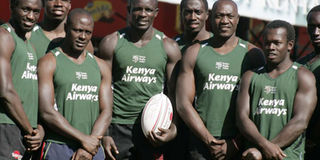Disgruntled Kenya 7s issue boycott threat

Kenya Sevens players pose for a picture on January 26 ahead of the World Rugby Wellington and Las Vegas legs. The team has threatened to boycott training. PHOTO | FILE |
What you need to know:
- Amonde said they are facing conditions that cannot allow them to play well.
- Bentz said the situation needs urgent intervention since certain parameters must be in place to warrant high performance environment.
Kenya Sevens technical bench and playing unit have vowed not to resume training on Monday unless their demands on training conditions are addressed.
The team that has been on a six-week break and is scheduled to resume training on Monday ahead of the 2016 Rio Olympic Games qualifying tournament due in November in South Africa and the 2015/2016 World Rugby Sevens Series starting in December.
Addressing a press conference in Nairobi team manager Steve Sewe, said the squad’s high performance training programme must resume and the high turnover on head coaches checked.
Sewe, said that both the technical bench and playing unit’s unpaid salaries that date back to three months must be settled and contracts and medical cover reviewed.
Sewe said there has been lack of clear direction from Kenya Rugby Union (KRU) on the way forward especially on their road map to the 2016 Rio Olympics and 2015/2016 World Rugby Series.
“There is no head start since nobody is talking to us from the union. We have no clear direction when the players’ contracts end this July,” said Sewe.
SENIOR PLAYERS
Sewe was flanked by assistant coach Vuyo Zangqua, strength and conditioning coach, Graham Bentz, captain, Andrew Amonde, deputy captain Collins Injera and senior players, Humphrey Kayange and Patrice Agunda.
Missing from the press conference was the head coach, Felix Ochieng, who said he was still in charge of the team even as rumours grew that he was on his way out.
“In 2011 the KRU undertook a commitment to transform the national sevens training program into a high performance system.
“Key to this was the establishment of a player-centred coach led system which involved player welfare as the top priority,” Sewe said. “However, a lot of challenges have been encountered in the recent past that have put the programme at risk.”
Sewe said there has been lack of timely and consistent remuneration adding that equipment have not been bought in the last three years with the team going without food supplements last season.
“There has been heavy interference by certain board members on technical issues and the high turnover of head coaches and lack of security in player contracts are not making things better,” said Sewe.
Sewe said as they seek to qualify for the 2016 Olympics and fight for a podium finish, a lot of the non-negotiable are not in place. “The program is too volatile for players to concentrate in the core business which has led to instability. We must build confidence as this is a culture change,” explained Sewe adding that the current environment is not conducive for performance and players are faced with the choice of seeking alternative means of survival instead of rugby. “Medical system is porous where players cannot put their bodies on the line. Players want to commit but nothing is on the table.”
In 2012, Sewe said the development team used to participate in satellite tournaments but that has since stopped.
Even though he still has the passion of transforming Kenya in a wining outfit, Vuyo said he is worried about what was happening. “The team has been neglected as it undertakes the massive challenge to the Olympics,” said Vuyo. “We have been pushed to the boundary and Kenyans must now know what has been happening. The players still have the dream for the Olympics.”
Amonde said they are facing conditions that cannot allow them to play well. “It’s even worse when nobody from the Union is talking to us,” said Amonde.
Bentz said the situation needs urgent intervention since certain parameters must be in place to warrant high performance environment.
Kayange said it will be disappointing for generations to come of Kenya fails to qualify for 2016 Rio Olympics especially after he was part of the World Rugby team that made rugby be included at the Olympics.




